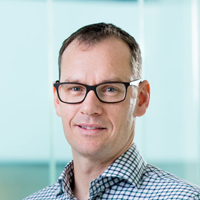Rare Disease Oncogenomics
-
Head of Laboratory

Associate Professor Richard Tothill
Research Overview
The Rare Disease Oncogenomics (RADIO) laboratory is dedicated to translational research of rare and less common cancers. Our research encompasses neuroendocrine tumours (NET), including tumours of sympathetic tissues (pheochromocytoma and parganglioma) and skin (Merkel cell carcinoma), as well as cancers of unknown primary (CUP).
We use advanced genomic and histology (cell-based) methods to comprehensively analyse tissues and blood samples taken from cancer patients. We are also developing cell line cultures and patient-derived organoids (three-dimensional cultures) from rare cancers to establish working tumour models. We are using these tools to better understand the underlying biology of rare cancers, develop better diagnostic and prognostic tests for the clinic, identify precise cancer treatments in individual patients and find predictive markers of therapeutic response.
Staff
Associate Professor Richard Tothill – Group Lead
Dr Richard Rebello ( Post-Doctoral Scientist/Project Manager)
Dr Aidan Flynn (Post-Doctoral Scientist/Bioinformatics)
Dr Ruining Dong (Post-Doctoral Scientist/Bioinformatics)
Dr Emma Boehm (Endocrinologist/PhD Candidate)
Alex Caneborg (PhD Candidate)
Kathryn Weller (Research Administration Officer)
Dr Wendy Ip (Project Co-ordinator)
Dr Laura Marie Beyit (Laboratory Manager)
Collaborators
Australia
Peter MacCallum Cancer Centre, Melbourne
Kolling Institute, Sydney
Royal North Shore Hospital, Sydney
Melanoma Institute Australia, Sydney
Peter Doherty Institute, Melbourne
ANZMTG (Australasian Merkel Interest Group, AMIGOs)
Australian SUPER study group
International
National Institute of Health, USA
University of Texas, USA
University of Colorado, USA
Uppsala University, Sweden
Tufts Medical Centre, Boston, USA
University of Florida, USA
University of Auckland, New Zealand
University of Michigan, USA
National Cancer Centre Singapore (NCCS), Singapore
University Hospital Essen/West German Cancer Centre/ German Cancer Consortium (DKTK)
American Australian Asian Adrenal Alliance (A5)
Funding
National Health and Medical Research Council (NHMRC)
Victorian Cancer Agency
Cancer Australia
Pheo-Para Alliance, USA
Paradifference, Sweden
Research Publications
See complete list of Richard Tothill’s publications.
- Fan, K, Ritter, C, Nghiem, P, Blom, A, Verhaegen, ME, Dlugosz, A,.. Tothill, RW….et al Circulating cell-free miR-375 as surrogate marker of tumor burden in Merkel cell carcinoma. Clinical Cancer Research. 2018. Published online July 30, 2018
- Dwight, T., Flynn, A., Amarasinghe, K., Benn, D.E. Lupat, R., Li, J.,…Tothill, RW (2018). TERT Structural rearrangements in metastatic pheochromocytomas. Endocrine-Related Cancer. 25(1):1-9.
- Lefebure M*, Tothill RW*,…, Johnstone RW (2017). Genomic characterisation of Eµ-Myc mouse lymphomas identifies Bcor as a Myc co-operative tumour-suppressor gene. Nature Communications. Mar;8:14581 * contributed equally.
- Flynn,A, Dwight, T, Benn, D, Deb, S, Colebatch, AJ, Fox, S… Tothill, RW (2017) Cousins not twins: intra and inter-tumoral heterogeneity in syndromic neuroendocrine tumours. Journal of Pathology. 242(3):273-283
- Flynn A, Dwight T, Harris J, Benn D, Zhou L, Hogg A, Catchpoole, D, … Tothill, RW (2016) Pheo-type: a diagnostic gene-expression assay for the classification of pheochromocytoma and paraganglioma. J Clin Endocrinol Metab. 101(3): 1034-43
- Moran S,…Tothill, R….et al. (2016) Epigenetic profiling to classify cancer of unknown primary: a multicentre, retrospective analysis. Lancet Oncol 17, 1386-1395
- Wong SQ, Waldeck K, Vergara IA, Schroder J, Madore J, Wilmott JS, …Tothill, RW (2015). UV-Associated Mutations Underlie the Etiology of MCV-Negative Merkel Cell Carcinomas. Cancer Research 75(24):5228-34
- Flynn, A., Benn, D., Clifton-Bligh, R., Robinson, B., Trainer, A. H., James, P., … Tothill, RW (2015). The genomic landscape of phaeochromocytoma. Journal of Pathology. 236(1): 78–89
- Tothill, RW, Shi, F, Paiman, L, Bedo, J, Kowalczyk, A, Mileshkin, L, et al (2015) Development and Validation of a Gene Expression Tumour Classifier for Cancer of Unknown Primary. Pathology 47(1): 7-12
- Tothill, RW, Li, J., Mileshkin, L., Doig, K., Siganakis, T., Cowin, P., et al (2013) Massively-parallel sequencing assists the diagnosis and guided treatment of cancers of unknown primary. Journal of Pathology. 231(4): 413-23.
- Tothill R, Estall V, Rischin D. Merkel cell carcinoma: emerging biology, current approaches, and future directions. (2015) Am Soc Clin Oncol Educ Book; 35:e519–26.
- Meldrum, C., Doyle,M.A. and Tothill, R.W. (2011) Next-Generation Sequencing for Cancer Diagnostics: a Practical Perspective. Clinical Biochemist Reviews 32: 177-95
Research Projects
- A5 SDHB Genomics Study
- Understanding the biology of Merkel cell carcinoma
- Developing clinical genomic methods for cancer of unknown primary
Faculty Research Themes
School Research Themes
Key Contact
For further information about this research, please contact Head of Laboratory Associate Professor Richard Tothill
Department / Centre
Unit / Centre
MDHS Research library
Explore by researcher, school, project or topic.